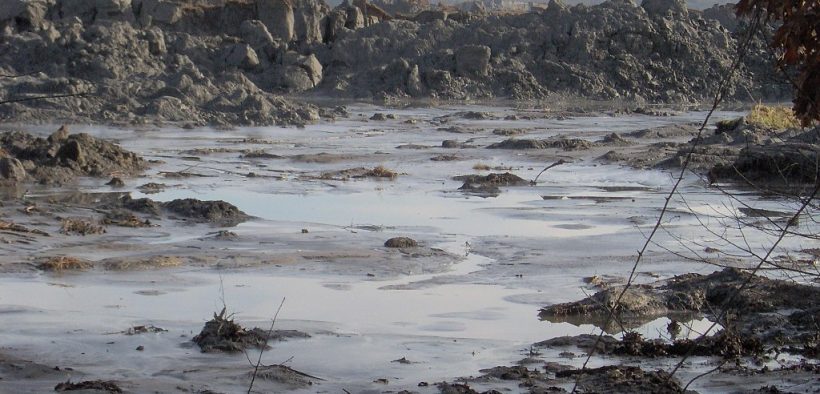Trump’s EPA Weakens Highly Toxic Coal Ash Regulations

The new toxic coal ash rollbacks join a litany of other slashed environmental protections, from methane to asbestos to carbon emissions.
The Trump Administration’s relentless rollbacks of environmental protections continued on Monday, as the Environmental Protection Agency unveiled new plans to reverse Obama-era protections aimed at protecting water bodies from toxic coal ash. Critics condemned the decision as a deluded attempt to revive the dying coal industry that poses tremendous risks to human and ecological health.
The EPA will relax inspections and oversight at coal-fired plants, the amount of discharge plants can release, and scrap requirements for new filtration technology.
The Obama administration estimated its new rules would prevent 1.4 billion pounds of toxic metals and pollutants from entering nearby water bodies. These pollutants, including arsenic, mercury, and other heavy metals, are linked to birth defects, cancer, and stunted brain development in young children, among other maladies.
Trump Administration’s Coal Policy
EPA head Andrew Wheeler considers the toxic coal ash rollbacks “common-sense.”
“These proposed revisions support the Trump administration’s commitment to responsible, reasonable regulations,” Wheeler said, “by taking a common-sense approach that will provide more certainty to U.S. industry while also protecting public health and the environment.”
Wheeler worked as a lobbyist for Murray Energy, the largest underground coal company in the U.S., before joining the Trump administration. Murray Energy was a fierce opponent of climate legislation, leading critics to believe Wheeler’s decision-making at the EPA is compromised by his extensive prior involvement with the industry he is charged with regulating.
During Wheeler’s time as a lobbyist with the coal giant, Murray paid millions in fines for contaminating water with coal slurry. Ironically, Wheeler claims unsafe drinking water is a greater public health risk than climate change.
Despite the Trump administration’s industry-friendly policies, Murray Energy filed for Chapter 11 bankruptcy protection last week. Murray is the eighth coal producer to collapse into bankruptcy in the past year, bolstering criticisms of the Trump administration’s coal-centric environmental policy.
“While it might keep some existing coal plants running a little bit longer, it’s at best a Band-Aid on a bullet wound that the market has sent the coal industry,” Joshua Rhodes, a senior energy analyst with Vibrant Clean Energy, told The New York Times.
Evidence shows that coal plants almost always pollute nearby water bodies. As Common Dreams notes, “an analysis released in March by Earthjustice and other environmental groups which showed that 91 percent of the 265 U.S. coal plants required to test nearby groundwater found unsafe levels of at least one coal ash contaminant, based on EPA standards.”
Toxic Coal Ash Rollbacks, One of Many
The rollback joins a litany of other slashed environmental protections, from methane to asbestos to carbon emissions. President Trump denies climate change and has purged his administration of scientists.
But as eminent scholar Noam Chomsky noted recently in an interview with the Intercept’s Mehdi Hasan, Trump’s bureaucracies have acknowledged the catastrophic threat of climate change and responded with nihilistic dismissal:
“The National Transportation Administration came out with what I think is the most astonishing document in the entire history of the human species. It got almost no attention. It was a long 500-page environmental assessment in which they tried to determine what the environment would be like at the end of the century,” Chomsky told Hasan.
“And they concluded, by the end of the century, temperatures will have risen seven degrees Fahrenheit, that’s about twice the level that scientists regard as feasible for organized human life. The World Bank describes it as cataclysmic. So what’s their conclusion? Conclusion is we should have no more constraints on automotive emissions. The reasoning is very solid. We’re going off the cliff anyway. So why not have fun? Has anything like that ever appeared in human history? There’s nothing like it.”















